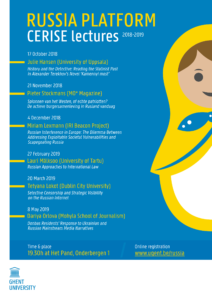Hieronder vind je een overzicht van lezingen en presentaties die in samenwerking met andere departementen of platformen, zoals het eureast platform, worden georganiseerd.
Academiejaar 2022-2023
To be announced
Event Information:
-
Woe08Mei201919:30Het Pand, Onderbergen 1, Gent
Cerise lecture: Donbas residents' response to Ukrainian and Russian mainstream media narratives
Dariya Orlova, Mohyla School of Journalism

Bio: Dariya Orlova is a Senior Lecturer and Deputy Director for Research at the Mohyla School of Journalism (National University of Kyiv-Mohyla Academy, Ukraine). She holds a PhD degree in Mass Communications from Autonomous University of Barcelona. Dr. Orlova was a Visiting Assistant Professor at Stanford University’s Center for Russian, East European and Eurasian Studies during the spring term of 2016.
Her articles appeared in peer-reviewed journals, including Journalism Studies, Europe-Asia Studies, Central European Journal of Communication. Her recent publications include, among others, a working paper "Computational Propaganda in Ukraine: Caught Between External Threats and Internal Challenges" based on a case study conducted as part of the project "Computational propaganda" by Oxford Internet Institute. Her major academic interests include: media transformations in transition countries, political communication, journalism culture, media and national identity.
She has also served as an independent media expert and researcher with NGOs, both local and international, and international development agencies. Among other projects, she has been contributing to the “Freedom of the Net Report” by Freedom House. Prior to her academic career, Dariya worked as a journalist for the English-language publication in Ukraine, Kyiv Post, and editor of the European Journalism Observatory website in Ukraine.
Abstract:
The Ukraine-Russia conflict, that has been strikingly fierce in the domain of media and information, exposed Ukrainian public to contradictory narratives propagated through the media and by the media. In addition to conflicting narratives, citizens have also been bombarded with all sorts of disinformation. As a result, the level of general confusion and distrust to information and the media has significantly increased among Ukrainians, as evidenced by a number of opinion polls. Residents of conflict-torn Donbas in particular have been affected by both, actual military actions and conflicting narratives. While there is available quantitative data on Ukrainian citizens’ attitudes to central statements within narratives promoted by Ukrainian and Russian governments, there has been a lack of studies exploring citizens’ perceptions of those narratives in a qualitative way. In my lecture I would like to share findings of a recent study that addressed this issue. The study is based on data obtained from 9 focus group discussions and in-depth interviews with 48 families conducted in eight different locations in government-controlled parts of Donetsk and Luhansk oblasts in summer of 2017. Analysis of how Donbas residents navigate different media and make sense of diverse and often contradictory information found there reveals widespread ambivalences that shape consumption of news media and attitudes to the clashing narratives regarding the conflict. A significant part of the region’s residents rejects central claims of both, ‘Ukrainian’ and ‘Russian’ narratives. Crucially, such a rejection is not driven by their assessment of ‘truthfulness’ or credibility of narratives, but rather stems from their broader political views. Widespread dissatisfaction with the situation in the region thus results in scepticism towards mainstream narratives. Instead, many people tend to develop and accept a kind of ‘middle-ground’ narrative that blends elements of Ukrainian and Russian mainstream narratives with popular interpretations of those elements. The presentation will discuss why many Donbas residents reject ‘Ukrainian’ narrative and what constitutes this ‘middle-ground’ narrative that finds significant acceptance.Online registration is required
Vorige jaren